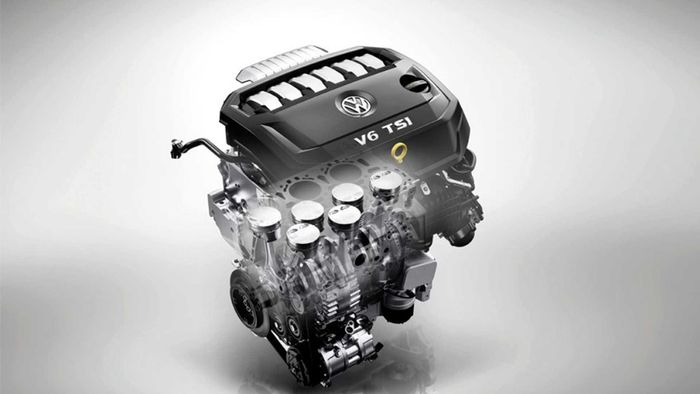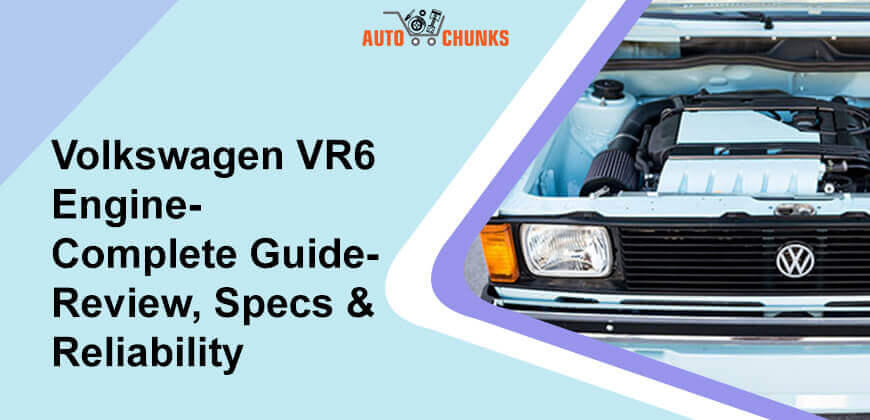When a question is asked about a car engine, its performance, reliability, and durability are always interlinked. Quite the same, the question about Volkswagen’s VR6 engine remains to be answered, are they reliable?
In this blog, we’ll share with you a couple of questions and answers concerning the Volkswagen VR6 engine and if it’s reliable enough. Also, we’ll include a few tips to help you tune the engine to perform better.
What is Volkswagen’s VR6 Engine?
Volkswagen’s VR6 engine is a six-cylinder piston engine having been produced in the 1990s era. It’s also quite interesting to know that the first letter used in the engine’s name i.e., ‘V’ is referred to the V-shaped configuration in which the cylinders are placed in a shared crankshaft, but have only a single cylinder head, hence making the angle.
The first 2.8-liter VR6 engine was introduced in the 1992 Volkswagen Corrado and Passat models. After seeing great success, the engine’s popularity grew and was later introduced in several consumer vehicles, such as the Jetta, Mk4 Golf GTI, Phaeton, Atlas as well as the Touareg. However, the most iconic versions were the 2004 and 2008 models of the Volkswagen Golf R32, which had a 3,2L VR6 engine installed to power the vehicle.


All these Volkswagen consumer vehicle models in the AWD (all-wheel drive or 4×4/4WD) category were designed to be hatchbacks and were powered by the 3.2-liter VR6 engine. The engine gave up to 240 horsepower for the 2004 models and up to 250 horsepower for the 2008 models.
Volkswagen however, did not just keep their VR6 engine to be used in only the cars they manufactured. Eventually, the engine started gaining appreciation and soon found its way into other car models, such as the Porsche Cayenne and Audis TT, A3, and Q7 variants. In addition to this, the Volkswagen VR6 engine technology also forms the basis in the development of the W12 engine that is used in the Bentley Continental GT model. Similarly, the engine used in the Bugatti W16 model uses is based on their engine technology, as well.
How reliable is the VW VR6 engine?
A lot of time has now passed since the introduction of Volkswagen’s VR6 engine. Even though the Volkswagen VR6 six-cylinder engine is no longer a state-of-the-art technology, it could still hold on to the title of being a reliable engine, or perhaps, not? However, it is not without its limitations though.
People that had owned and driven cars powered by the Volkswagen VR6 engine have shared their thoughts, especially concerning how reliable is the engine. For instance, some have complained about problems, such as issues with the ignition system. During the early years when the VR6 engine made its appearance in the market, it had coil packs. However, their ignition system had to face certain problems, like experiencing coil pack failure. However, the issue was responded to, and the manufacturer began to include ignition coils in their later engine models.
But, that wasn’t the only problem the makers of the VR6 engine had to go through. Another issue occurred and was reported to the National Highway Traffic Safety Administration (NHTSA), USA, by the owner of a Volkswagen Golf R32 2004 model. The owner had experienced similar problems with their car’s ignition system.
Problems related to engine heating also became a concern for the VR6 engine model. Furthermore, the fact that Volkswagen used certain parts made from plastic, like in the engine’s water pumps, and the cooling pipe, those parts were also bound to degrade as time passed by. It is assumed that this was because of the reason that it had a narrow engine compartment. Thus, if the engine started to overheat, the cylinder head gasket could fail, which was also seen as another old problem with the VR6 engine model.
In addition to these, the Volkswagen VR6 engine also previously had certain problems, such as with the belt tensioner and the timing chain, as well. However, these issues are no longer so much of an inconvenience, rather it’s now become more a matter of age. Although the timing chains are said to usually last longer than belts, they sometimes may need to be replaced, with wear and tear over time. This is also true in the case of the chain belt and the tensioner that is placed in the engine.
Troubleshooting Volkswagen Engine Problems
Fortunately, most of the problems, including the ones mentioned above, are now easily taken care of. However, we should also note that certain parts in an engine or a car as a whole, will tend to wear out with time and thus, needs to be replaced. Other than that, if any technical issues are occurring with any components in a car, some of these problems can be fixed without difficulty.
Also, all these problems do not necessarily have to be seen as being a disruptive factors. For instance, in the case of the chain and belt of the Volkswagen VR6 engine, these components will eventually wear out and thus, are also parts that can be seen being used in other engine models, too. Therefore, simply following the maintenance schedule and keeping an eye on the state of your car’s engine periodically can surely help in making important decisions.
As far as the VR6 engine’s cooling pipe, water pump, and hoses, etc., components are concerned, you can easily find replacements for such parts, or perhaps, even better alternatives, too. Most parts of the engine may have a short life and must be replaced to avoid running through problems.
According to the Department of Consumer Affairs, as far as the ignition coils and ignition cables are concerned, Volkswagen has now announced an introduction of the 2.8-liter VR6 engine. Also, concerning its other engine models, the NHTSA has stepped in to look into the problem, which may take some time before things finally get sorted. In addition to this, Volkswagen has also been continuously analyzing problems with the ignition coils, the tuning ratio, and the ECS.
While many car owners are expressing their doubts and concerns on several online forums, some of them also share that many of the new parts may not be as good as the previous ones. Finally, the hot stop problem was also solved with the help of Volkswagen’s TSB. All it takes is an ECU reflux to update the software. Volkswagen’s engines could generally last longer if they are maintained and cared for properly. The Volkswagen cars you buy today will usually last much longer than those VW cars that are now ten or more years old.
Bottom Line
Although the reliability and durability of the VR6 engine may be linked together, not in the same way as maintenance. This may be due to the reason that if you constantly are required to replace certain components of your Volkswagen VR6 engine, merely to keep it running, then this may not be considered a reliable engine. Instead of replacing it with new, you can opt for used engines. However, at certain times, you may only need a few tweaks or upgrades here and there to make things much easier, considering your expenses for such parts, as well.


Write A Comment